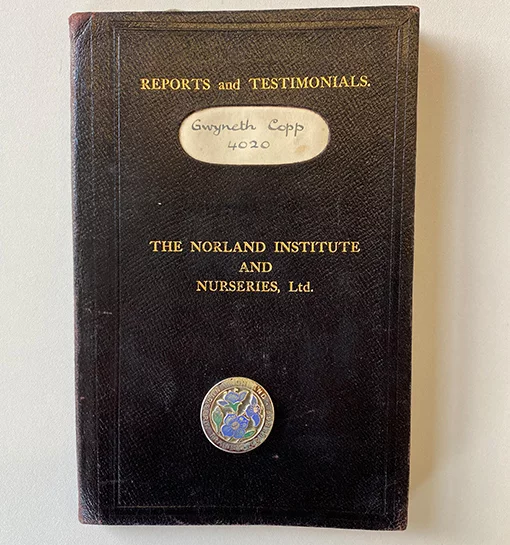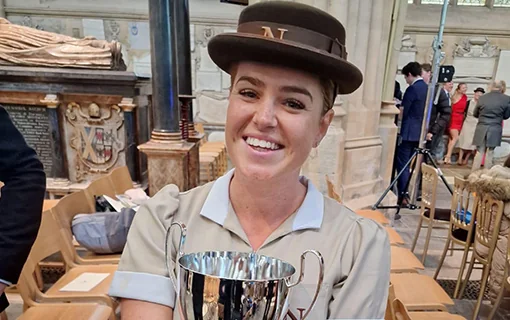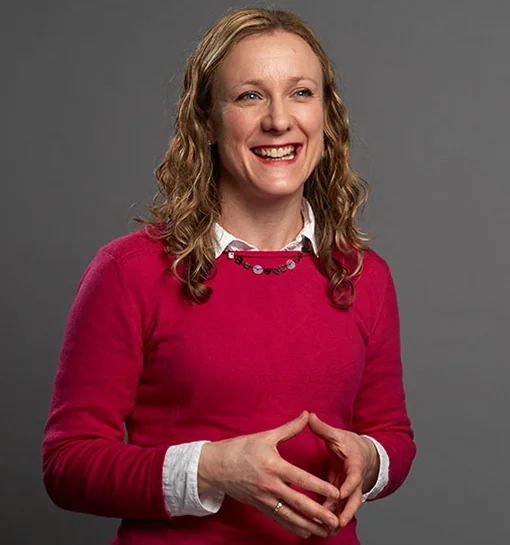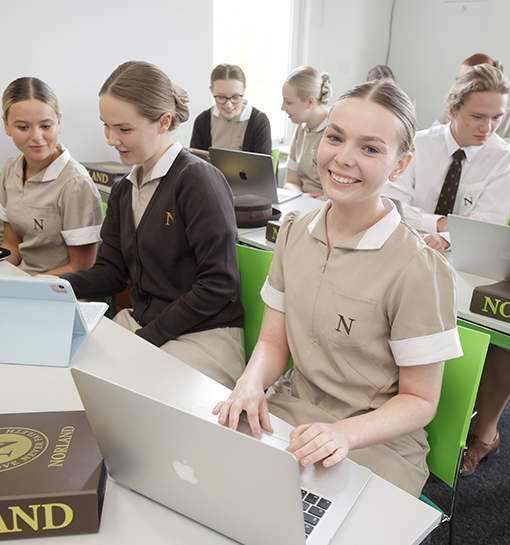The History of Norland in 13 objects: a collection of Norlander artefacts from 1944-1973
14 February 2023

The tenth object in our series is a collection of artefacts belonging to Norlander Gwyneth (Set 70) who completed her training in 1947. Gwyneth’s career as a nanny spanned almost fifty years. Included in her collection, which was donated by a former charge, are her Norlander and speedwell badges, a dictionary for mothers from 1955, a collection of letters and Gwyneth’s notebook documenting her life as a Norland Nanny. Gwyneth’s collection of artefacts offers an intimate look at the day-to-day lives of Norlanders, and an insight into the childcare practices of the time.
Gwyneth began her Norland training in September 1944. The Norland Nursery Training College (as it was then known) was partially based in Chislehurst, having evacuated from London to escape the heavy German bombing of World War II. She joined Norland when its nurseries – Daisy for younger children and Spring for older children – were filled with many evacuees from London, who were adjusting to life without their parents. To ease the transition, Norland nurses were assigned to sleep in the nurseries with the children. So, Gwyneth and her peers often worked around the clock.
Gwyneth, like all graduating students, received a Norland badge which was kindly donated back to Norland by a former charge. These badges contain three of the familiar blue speedwell flowers (that symbolise healing, recovery and joyfulness) enclosed in a brown boarder inscribed “Norland Nursery Training College”. This badge would have been given to Gwyneth prior to her graduation. She was known to have worn the badge with pride on the left-hand side above the ‘N’ logo of her uniform, which she continued to wear for much of her career.
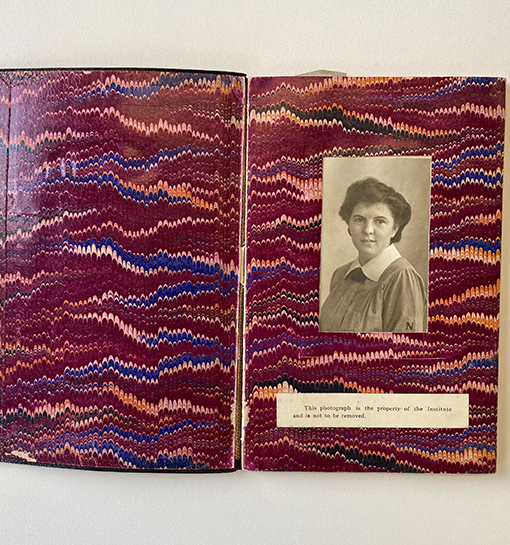
Despite the 1941 law that required all able women between the ages of 20 and 40 to register for war work, Norland still maintained a stable number of applications in the years that followed. Gwyneth’s Norlander badge contains an inscription detailing her full name and confirms that she was Norland’s 4,020th student. From its first enrolment of five students in 1892, Norland had grown exponentially during its first fifty years, despite two world wars and a worldwide economic depression.
During Gwyneth’s wartime training, Norlanders were not allowed to work in private homes unless there were exceptional circumstances. Those with early years training were placed in war nurseries. As the war progressed, there was a need to mobilise the female workforce which was an impossible task without adequate childcare as the typical war-time factory worker was expected to work between 10–12-hour shifts including Saturdays and Sundays due to the demands of war.
Government-funded day nurseries were opened to care for young children so their mothers could join the war effort. Until this point, Norlanders had their probationary year within a family setting (much like the Newly Qualified Nanny year of today). However, Gwyneth and the rest of her set experienced a very different probationary year as they were required by law to join the war nurseries. Gwyneth’s testimonial book documents that she was nurse to 36 children aged between two and five years old.
Towards the end of the war, when soldiers returned and re-joined their previous roles, mothers returned to the home. The war nurseries were closed so Norlanders were able to nanny for private families once again. Gwyneth’s journal records that she joined a new family to care two charges, a little boy and girl, once the war and her probationary year were finished.
Gwyneth documented her life as a Norland nurse throughout her career. She noted one of her nightly rituals with her charges: “after the story from their book they often say, “now tell me a true story!” These true stories have always given so much pleasure that I’ve decided to share them.” She wrote the stories down in her journal. The red wire-bound notebook’s yellowed pages are full to the brim with hand-written anecdotes documenting the intimate moments of her career that one is seldom privy to.
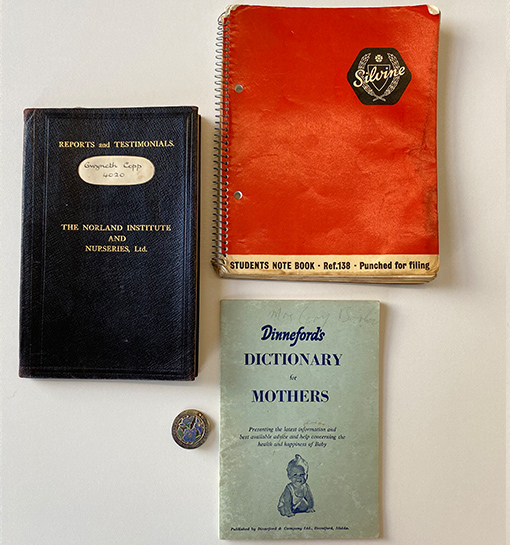
Gwyneth’s love for children is evident from the beginning pages. “For a very long time I’ve been looking after other people’s children,” she wrote, “I began when I was a child myself, about the age of ten.” Gwyneth included stories in the notebook from her own childhood. When donating Gwyneth’s extensive collection to Norland, her previous charge reminisced on these stories and that they always had a lesson to be found within them. An introductory tale presents Gwyneth receiving pocket money, which she was told to save, but she escaped to buy herself sweets. “I must have had six chocolate flakes,” she said. Characteristically, the humour of little Gwyneth’s adventure had an underlying lesson, as she felt terribly sick: “I heard my Daddy call me into the house and I was sure there was trouble!” These stories, simple in nature offer an insight into how she interacted with her charges, avidly noting down her stories so they learnt through play in keeping with Emily Ward’s teachings.
In her journal, Gwyneth also documented how she utilised her Norland training in practice and adhered to Norland’s mottoes ‘Love never Faileth’ and ‘Strength in Adversity’ throughout her career. In one entry, she described how she cared for a very sick young charge who “was charged to lie on his sick bed with only the nanny he knew and trusted in attendance.” What could be a terrifying experience for a child, was made comfortable by Nurse Gwyneth. Her charge remained in hospital for two months and was “in great pain, unable to sit up or play.” Norland teaching enables its students to be resourceful in challenging conditions and Gwyneth would have been tested watching the child for whom she cared so deeply for in pain. No doubt she would have also drawn on her hospital training, still a unique component of Norland’s training today. Gwyneth kept her charge as content as possible and she sat with him for what felt like “hundreds of hours” and told tales of how his friends would soon visit and the fun they would have. She noted how he was quickly able to joke back with her, despite being bedbound.
In her journal, Gwyneth described her role as varied and busy. She cooked, cleaned, played with, supported and guided the children in her care. The bond between her and her charges is evident. “The boy would only sleep after he had seen his nurse!” she wrote of another little charge. Gwyneth was present for many major milestones throughout her charges’ lives, from weaning and learning to walk, to watching their siblings go off to school and coping with loneliness. Gwyneth wrote at length about a young charge with no siblings at home who created “imaginary games of cricket with an imaginary friend.”
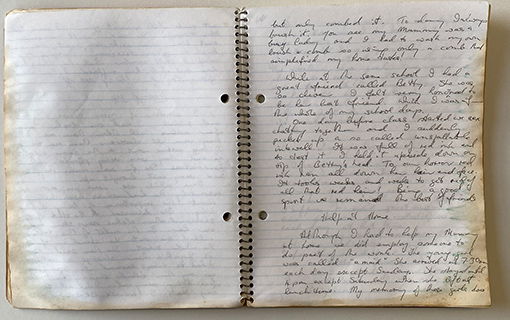
Gwyneth’s collection also includes a blue paper-bound book: The Dinneford’s dictionary for mothers: presents the latest information and best available advice and help concerning the health and happiness of baby. Published in 1955, the pamphlet (which advertised Dinneford’s magnesia products for babies which promised to remedy heartburn, headache, teething pain, indigestion and more) contains lists of ailments common in childhood and how to treat them, from symptoms of asthma to measles. The book, evidently well-used, has a child’s measuring chart on the back, which Gwyneth used to regularly record the measurements of her growing charges. This notebook gives an insight into standard healthcare practices at the time, especially the post-war years, where medicine was still sparse as Britain rebuilt itself.
Gwyneth’s passion and commitment to her career as a Norland nurse are evident in her collection. Her Norland badge is well-worn, and her notebook contains details of years of faithful service in multiple roles, once her first charges went off to boarding school. Gwyneth was keen to share her experiences as a “Nannie” and sought advice from journalists on how to improve her storytelling skills. Gwyneth went on to have a long and varied career, working with high-profile families and in boarding schools.
Her final role was to return in her retirement to support her one of her first charges. After the death of her husband, Gwyneth’s now adult charge was struggling to care for her own young children alone. Having always been present as a family friend, Gwyneth once again took up the role as a Norland nurse to help care for the children until their school days and beyond.
A tradition that began when her first charge was only a baby, her former charge wrote in her letter to Norland that “Gwyneth never took Christmas off, she said she always wanted to watch us open our presents!” Gwyneth’s lifelong dedication to her career as a Norland Nanny and to supporting her charges throughout their childhood and beyond is testament to Norland’s core values and mission. It is through its Norlanders that Norland’s unique training and approach, underpinned by its founding mottoes ‘Love Never Faileth’ and ‘Strength in Adversity’, is upheld as the gold standard, today as it was in 1892.
